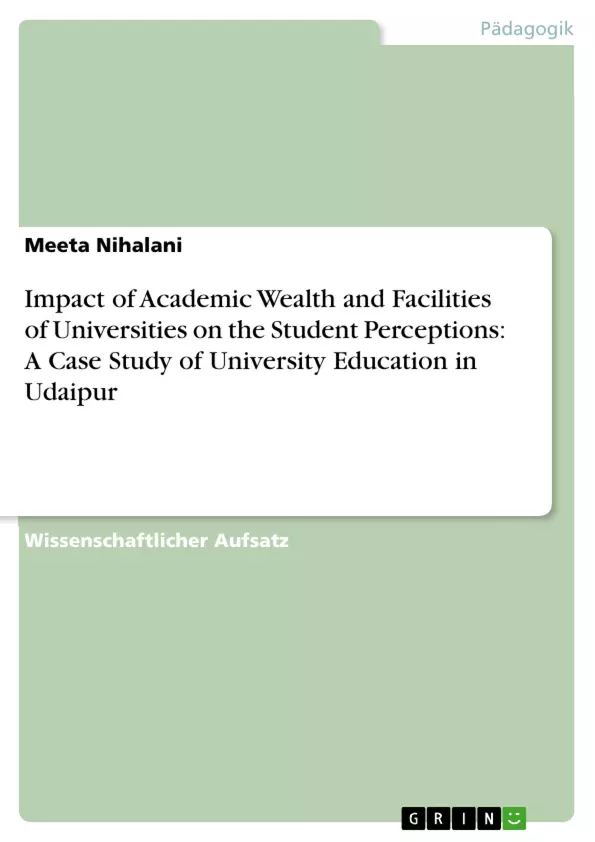The academic wealth of the universities is not only decided by the content and the quality of
the knowledge collected in the libraries but also by way, the education is imparted and
delivered to the students. The services quality of education delivery is important because it
trains the students by developing their personality and building the skills to create a better
tomorrow. The aim of the paper is to build the strategic inputs for designing the quality
delivery of education to the students who have the analytical power and confidence to
contribute the destiny of better tomorrow for the country.
Inhaltsverzeichnis
- Abstract
- Einleitung
- Literaturübersicht
- Ziel der Studie
- Hypothesen
- Forschungsmethodik
- Datenanalyse
Zielsetzung und Themenschwerpunkte
Die Studie untersucht die Auswirkungen der akademischen Ressourcen und Einrichtungen von Universitäten auf die Wahrnehmung der Studierenden. Das Hauptziel ist es, strategische Maßnahmen zur Verbesserung der Qualität der Hochschulbildung zu entwickeln und die Zufriedenheit der Studierenden zu steigern.
- Auswirkungen akademischer Ressourcen auf die Studierendenwahrnehmung
- Zusammenhang zwischen Wissensmanagement und Kompetenzentwicklung der Studierenden
- Entwicklung strategischer Maßnahmen zur Verbesserung der Hochschulbildung
- Einfluss demografischer Faktoren auf die Studierendenwahrnehmung
- Bewertung der Qualität der Hochschulbildung in Udaipur
Zusammenfassung der Kapitel
Die Einleitung betont die Bedeutung qualitativ hochwertiger Bildung für die persönliche und berufliche Entwicklung der Studierenden sowie für das Wirtschaftswachstum eines Landes. Die Literaturübersicht analysiert verschiedene Modelle zur Qualitätsmessung in der Hochschulbildung, wie TQM, EFQM, Balanced Scorecard und SERVQUAL. Die Zielsetzung der Studie umfasst die Evaluierung der Qualität der Hochschulbildung in Udaipur, die Untersuchung des Einflusses von Wissensmanagement auf die Studierenden und die Entwicklung von Verbesserungsstrategien. Die Forschungsmethodik beschreibt die Datenerhebung mittels Fragebögen und die angewandten statistischen Verfahren (ANOVA).
Schlüsselwörter
Hochschulbildung, Qualitätsmanagement, Studierendenwahrnehmung, Wissensmanagement, Kompetenzentwicklung, Datenanalyse, ANOVA, Udaipur.
Häufig gestellte Fragen
Was ist das Hauptziel der Studie über die Universitäten in Udaipur?
Das Hauptziel ist die Untersuchung der Auswirkungen akademischer Ressourcen und Einrichtungen auf die Wahrnehmung der Studierenden, um strategische Maßnahmen zur Qualitätsverbesserung der Hochschulbildung zu entwickeln.
Welche Rolle spielt die Qualität der Bildungsvermittlung laut der Arbeit?
Die Qualität der Vermittlung ist entscheidend, da sie die Persönlichkeit der Studierenden schult und Fähigkeiten aufbaut, die für die zukünftige Entwicklung des Landes wichtig sind.
Welche statistischen Verfahren wurden in der Forschung angewandt?
In der Datenanalyse wurde unter anderem das statistische Verfahren ANOVA eingesetzt, um die erhobenen Fragebögen auszuwerten.
Welche Qualitätsmanagement-Modelle werden in der Literaturübersicht analysiert?
Die Studie analysiert verschiedene Modelle wie TQM (Total Quality Management), EFQM, die Balanced Scorecard und SERVQUAL zur Messung der Bildungsqualität.
Wie wird der Begriff "akademischer Wohlstand" in diesem Kontext definiert?
Er entscheidet sich nicht nur durch den Inhalt und die Qualität des Wissens in Bibliotheken, sondern auch durch die Art und Weise, wie Bildung an die Studierenden vermittelt wird.
Welchen Einfluss haben demografische Faktoren in dieser Studie?
Die Untersuchung umfasst auch die Analyse, wie demografische Faktoren die Wahrnehmung der Studierenden hinsichtlich ihrer Ausbildung beeinflussen.
- Quote paper
- Dr. Meeta Nihalani (Author), 2012, Impact of Academic Wealth and Facilities of Universities on the Student Perceptions: A Case Study of University Education in Udaipur, Munich, GRIN Verlag, https://www.grin.com/document/187282



